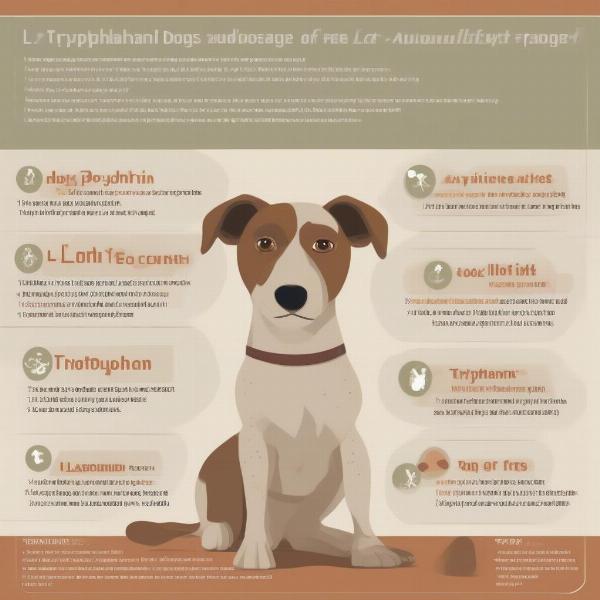L-tryptophan for dogs has gained attention for its potential to address various behavioral and health issues. But what exactly is it, and how can it benefit your canine companion? This comprehensive guide explores the science behind l-tryptophan, its uses, potential benefits, and important considerations for dog owners.
Understanding L-Tryptophan
L-tryptophan is an essential amino acid, meaning dogs cannot produce it naturally and must obtain it through their diet. It plays a crucial role in protein synthesis and is a precursor to serotonin, a neurotransmitter that influences mood, sleep, appetite, and other important functions. A deficiency in l-tryptophan can lead to various behavioral and physical problems in dogs.
Benefits of L-Tryptophan for Dogs
L-tryptophan supplementation can offer several potential benefits for dogs, including:
- Anxiety and Stress Reduction: By increasing serotonin levels, l-tryptophan can help calm anxious or stressed dogs, making it a useful tool for managing noise phobias, separation anxiety, and travel-related stress.
- Improved Sleep: L-tryptophan’s role in serotonin production also contributes to better sleep quality. This can be especially helpful for dogs with sleep disorders or those experiencing disrupted sleep due to anxiety.
- Appetite Regulation: Serotonin influences appetite, and l-tryptophan may help regulate food intake in dogs with certain eating disorders.
- Pain Management: Some studies suggest that l-tryptophan may have pain-relieving properties, potentially offering a complementary approach to managing chronic pain in dogs.
- Aggression Reduction: While more research is needed, l-tryptophan may help reduce impulsive aggression in some dogs by promoting a sense of calm and well-being.
How to Give L-Tryptophan to Your Dog
L-tryptophan is available in various forms, including capsules, tablets, and chews. Always consult your veterinarian before giving your dog any supplements, as they can determine the appropriate dosage based on your dog’s size, age, and health condition. They can also advise on potential interactions with other medications your dog might be taking.
Dosage and Potential Side Effects
The correct dosage of l-tryptophan for dogs varies depending on individual needs and should be determined by a veterinarian. While generally considered safe, potential side effects can include:
- Gastrointestinal upset: Vomiting or diarrhea may occur, especially with higher doses.
- Drowsiness: This is a common side effect due to l-tryptophan’s calming effect.
- Loss of coordination: In rare cases, high doses may cause ataxia or difficulty walking.
 L-Tryptophan dosage and side effects for dogs
L-Tryptophan dosage and side effects for dogs
L-Tryptophan and Other Calming Aids
L-tryptophan can be used in conjunction with other calming aids for dogs, such as calmex for dogs. However, it’s crucial to discuss combining any calming aids or supplements with your veterinarian to ensure safety and effectiveness.
What to Look for in L-Tryptophan Supplements
When choosing an l-tryptophan supplement for your dog, look for high-quality products from reputable manufacturers. Check for purity and ensure the supplement is free from unnecessary additives or fillers.
Can Diet Alone Provide Enough L-Tryptophan?
While some dog foods contain l-tryptophan, it’s often not enough to address behavioral issues like anxiety or aggression. Supplementation may be necessary to achieve therapeutic levels.
Conclusion
L-tryptophan can be a valuable tool for managing various behavioral and health issues in dogs. By promoting serotonin production, it can help reduce anxiety, improve sleep, and potentially address other concerns. Always consult your veterinarian before starting your dog on l-tryptophan or any other supplement to ensure its safety and appropriate usage.
FAQ
- Is l-tryptophan safe for all dogs? While generally safe, it’s important to consult with your veterinarian before giving it to your dog, especially if they have underlying health conditions or are taking other medications.
- How long does it take for l-tryptophan to work in dogs? The effects can vary, but some dog owners report noticeable changes within a few days to weeks of starting supplementation.
- Can I give my dog human l-tryptophan supplements? No, it’s always best to use supplements specifically formulated for dogs. Human supplements may contain different dosages or ingredients that could be harmful to pets.
- What are the signs of l-tryptophan deficiency in dogs? Signs can include anxiety, aggression, poor sleep, and changes in appetite.
- Can l-tryptophan be used long-term in dogs? With veterinary guidance, l-tryptophan can be used long-term to manage ongoing behavioral or health issues.
- What are some natural sources of l-tryptophan for dogs? Turkey, chicken, fish, and eggs are some dietary sources of l-tryptophan.
- Can l-tryptophan interact with other medications? Yes, it can potentially interact with certain medications, so always consult with your veterinarian before giving it to your dog.
Related Articles
Check out our other articles on dog health and behavior:
ILM Dog is a leading international pet website dedicated to providing dog owners worldwide with reliable, practical information on all aspects of dog care and nurturing. We offer expert advice on breed selection, health and medical care, training and behavior, nutrition, grooming, exercise, puppy care, senior dog care, and travel. We strive to empower dog owners with the knowledge they need to provide their furry friends with the best possible care. For any inquiries, contact us at [email protected] or +44 20-3965-8624. ILM Dog also offers a wide range of products and accessories to enhance your dog’s well-being. Visit us at ILM Dog for more information.